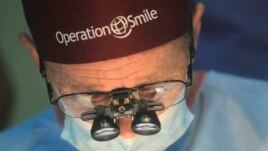28 April, 2019
Vietnam is officially a socialist republic, but the country is starting to make parts of its health care system private.
The move raises questions about whether the government can guarantee care for all as a basic right, and about how much it will spend on health care.
The Pham Ngoc Thach University of Medicine is a medical school in Ho Chi Minh City. It receives money from the government. This month the university said it is looking for a private investor to help it expand. The school wants to build a new training and health care center on its grounds. It said the idea is for the university to take responsibility for the center's operations and the training, while a private company would handle the actual building project.
Private money may be needed
Doctor Ngo Minh Xuan is the Rector of the Pham Ngoc Thach University of Medicine. He said that "Ho Chi Minh City's health care needs are critical due to rapid urbanization and a growing population." But he noted that hospitals cannot meet those growing health care needs effectively by depending only on public money.
The efforts to partially privatize health services are part of a larger movement in the country of 100 million people. More and more international hospitals are opening up or expanding.
For example, the Hanh Phuc International Hospital, which opened in 2011 near Ho Chi Minh City, calls itself the "Singapore Standard Hospital" and treats women and children.
The Viet Duc University Hospital is also known as the Vietnam Germany Hospital. It has exchange and training programs with medical centers in France, Germany and Australia.
Vietnam's government increasingly permits financing from private companies or groups, such as through a trade deal with the European Union that permits higher foreign investment.
Health care for all
Since the Vietnam War ended in 1975, the government has provided health care for every Vietnamese citizen. Most people have insurance policies that the government helps to pay for. But individuals use their own money to pay some of the costs.
Doctors treat their job as a public service. They often travel from their home base to hospitals in rural areas and other communities in need of medical services.
The government also works to improve health care in the countryside through community health centers. These local centers admit patients more easily than the big city hospitals.
Vietnam offers better health care services than neighboring countries as measured by international researchers. Between 2009 and 2018, the average life expectancy rate rose from 74.8 years to 75.9 years. The country's measures of good health care services and supply of food also rose.

Operation Smile co-founder Bill Magee performs a facial deformity repair surgery for a patient, at the Vietnam Cuba hospital in Hanoi, Nov. 18, 2014.
Weaknesses in the system
Still there are weaknesses in the health care system. Some people say these problems could be solved with more private investment. A sick person often has to pay a bribe to a doctor to request better care. Other patients have to share hospital beds or wait outside medical buildings.
The Vietnamese government has gotten close to its public debt ceiling of 65 percent of gross domestic product – that is, the total value of goods and services produced during a year.
There has been a drop in the rate of doctors per 1,000 people and in the relative number of hospital beds available over the past 10 years. That is especially hard for Ho Chi Minh City, the southern business center and home for 13 million people. The city's population represents about one-fourth of Vietnam's overall demand for health care. The Vietnam Chamber of Commerce and Industry reports that Ho Chi Minh City has more than 100 hospitals.
Another change coming to Vietnam is economic. The country is expected to move from a lower middle-income nation to an upper middle-income nation in the next 10 years.
Asia Pacific chief economist Rajiv Biswas and economist Bernard Aw recently prepared a report for investment research firm IHS Markit. They found that the change "will make Vietnam a fast-growing market for a wide range of goods and services."
Since health care will be counted as one of those services, it is likely that Vietnam's debate about private funding of health care will continue.
I'm Jill Robbins.
Ha Nguyen reported on this story for VOA News. Jill Robbins adapted it for Learning English. George Grow was the editor.
_________________________________________________________________
Words in This Story
socialist – adj. describes a government which supports that the means of production, distribution, and exchange should be owned or controlled by the community as a whole
rector – n. a leader; someone who directs something, such as a religious group
urbanization – n. the process by which towns and cities are formed and become larger as more and more people begin living and working in central areas
privatize – v. to remove (something) from government control and place it in private control or ownership
insurance – n. a method of guaranteeing safety or protection
bribe – n. something valuable that is given in order to get someone to do something
income – n. earnings; monetary gain
What do you think of private hospitals in comparison to public hospitals? We want to hear from you. Write to us in the Comments Section.